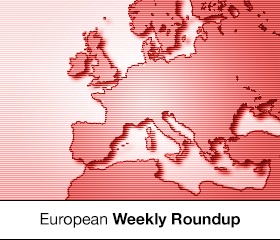Adblocker Ruling Sets Back German Publishers; No More 'Safe Harbour' in Europe
by Sonja Kroll on 2nd Oct 2015 in News


ExchangeWire rounds up some of the biggest stories in the European digital advertising space. In this week’s edition: Adblocker court-ruling against publishers in Germany; Potential 'Safe Harbour' changes may have implications for European-based US companies; comScore and Rentrak present a united front; Shine goes Caribbean; and BrightRoll becomes Yahoo's unified programmatic brand.
Set-back for publishers in Germany
Not one but now three German courts have ruled in favour of adblocking. Rejecting a claim by major German media conglomerate Axel Springer, the court in Cologne is the latest to declare Eyeo's Adblock Plus browser extension legal, in the sense that it does neither infringe on copyright, nor on competition and market dominance.
In a string of legal cases, all three courts found that Eyeo is not in direct competition with Springer's media platforms and therefore is not purposefully obstructing a competitor. Moreover, the decision for the installation of ad-blocking software is made autonomously by the users who have a right to protect themselves against unwanted advertising, the court said.
The rulings are remarkable for an advertising market that is strongly dominated by publishers. From their perspective, Eyeo is unfairly intervening in the market due to the practice of whitelisting via Eyeo's 'Acceptable Ads' initiative.
A court in Hamburg ruled earlier in April against German weekly broadsheet Die Zeit and business daily Handelsblatt, while a Munich court rejected the arguments of media groups RTL and ProSieben in May 2015.
No more safe harbour in Europe?
In a bid to protect the privacy rights of European citizens, the advocate general of the European Court of Justice has recommended that the European Court invalidate the current Safe Harbour agreement between the EU and the US. The recommendation by Yves Bot will have repercussions for US companies in Europe.
Despite the Safe Harbour rule, US companies such as Facebook may have transferred data pertaining to European citizens en masse to the US, a practice that was first highlighted by US-whistleblower Edward Snowden. Moreover, the protection of such data may be compromised as the privacy standards applied to the data transfers are neither checked nor set by the EU authorities.
“Although it was aware of shortcomings,” the EU advocate general writes, “the Commission neither suspended nor adapted [the agreement], thus entailing the continuation of the breach of the fundamental rights of the persons whose personal data was and continues to be transferred under the safe harbour scheme.”
If the legal agreement between the US and the EU is suspended, companies could be exposed to further scrutiny from privacy watchdogs in Europe, potentially culminating in governments demanding that local data be stored in local EU countries rather than on US servers.
A verdict in the case that prompted Mr Bot's recommendation is expected for next month.
comScore and Rentrak merge
A merger of measurement firms comScore and Rentrak could create a rival company that can make an impact world-wide. Audience measurer comScore has agreed to acquire its TV-rankings competitor Rentrak in a bid to set the two companies up for competition with measurement giant Nielsen. Combined, comScore and Rentrak could widen their expertise, and measure media content and ad campaigns across digital and TV.
"Together we have an even more powerful ability to deliver what our clients and the media industry have long been asking for: a comprehensive cross-platform measurement currency that accounts for all the ways in which content is consumed, whether that happens on a desktop, mobile device, live or time-shifted TV, video on demand or through over-the-top devices", says comScore CEO Serge Matta.
According to the merger agreement, each Rentrak share will be converted into 1.15 shares of comScore. At the helm of the merged company will be comScore's current CEO, Serge Matta, while Rentrak's CEO will take a new position as executive vice chairman and president.
Shine lands first public client
Shine's ad-blocking solution is set to be put to the test by its first public client. The Caribbean phone carrier Digicel has announced it will begin using Shine ad-blocking technology in Jamaica, and then roll out the ad-control software to its other markets in the Caribbean and South Pacific.
"We believe it is now time for everyone in the digital advertising ecosystem to look to the future and start having a conversation about how better and sustainable digital advertising can be created to foster stronger, mutually beneficial relationships that are based on transparency and trust", says Shine's CEO Ron Porat, echoing CMO Roi Carthy's stance on the controversial ad-blocking panel at ATS London last month.
With the first mobile carrier to adapt an ad-blocking solution, already-under-siege by publishers, who are dealing with rising ad prices, may find themselves under even more pressure. Not least since Apple recently confirmed its decision to allow ad-blocking apps on their devices.
According to business insiders, Shine has already signed up further clients.
Yahoo's programmatic offerings now under BrightRoll umbrella
In their own words, Brightroll is the company's "new unified brand for programmatic advertising technology", Yahoo has announced during Advertising Week in New York.
Ever since acquiring BrightRoll in December 2014, Yahoo has been concentrating on establishing an open portfolio of programmatic buying and selling tools which can handle any format. This suite is now combined in the BrightRoll DSP in conjunction with the BrightRoll Exchange for video and display advertising across all devices.
BrightRoll's DSP aims to deliver efficient programmatic buying for video, display and native ads on Yahoo inventory, based on the user data collected by Yahoo. BrightRoll Exchange connects sellers and buyers of video and display offerings, including external publishers, and is integrated with 100 DSPs.








Follow ExchangeWire